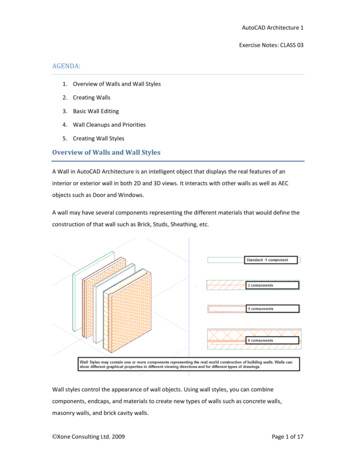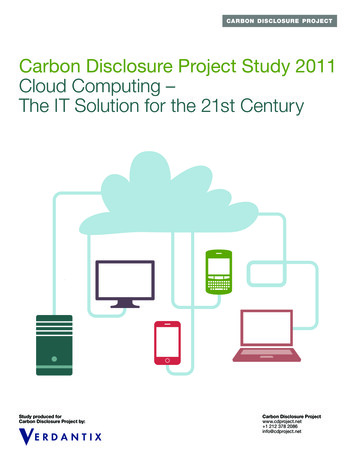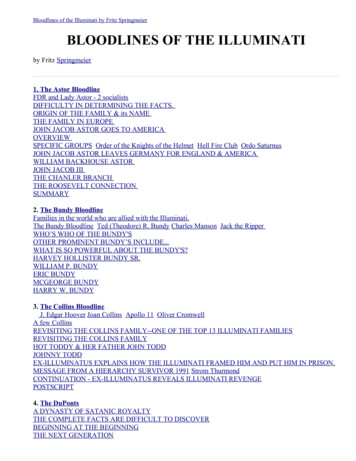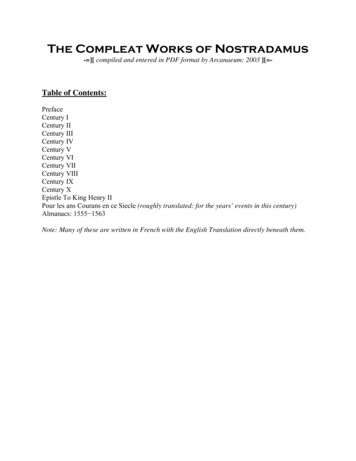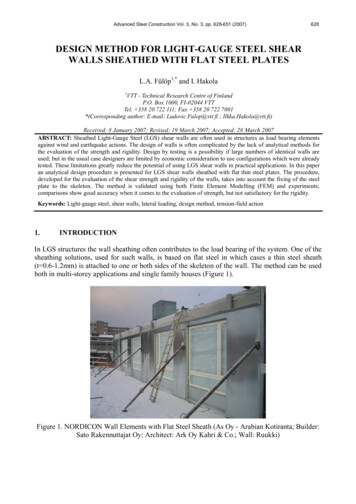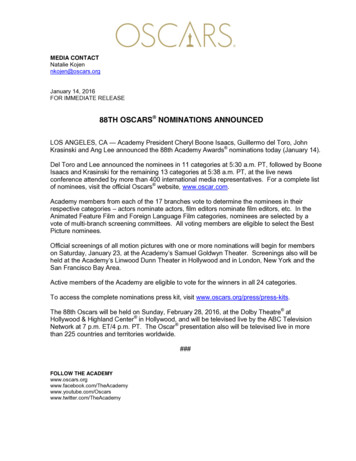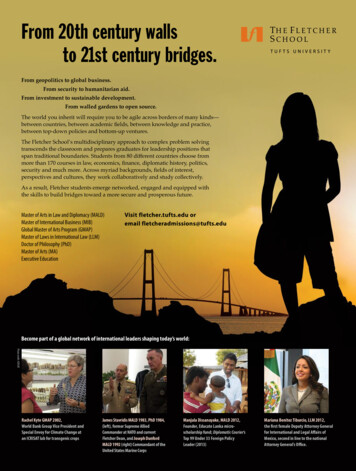
Transcription
From 20th century wallsto 21st century bridges.From geopolitics to global business.From security to humanitarian aid.From investment to sustainable development.From walled gardens to open source.The world you inherit will require you to be agile across borders of many kinds—between countries, between academic fields, between knowledge and practice,between top-down policies and bottom-up ventures.The Fletcher School’s multidisciplinary approach to complex problem solvingtranscends the classroom and prepares graduates for leadership positions thatspan traditional boundaries. Students from 80 different countries choose frommore than 170 courses in law, economics, finance, diplomatic history, politics,security and much more. Across myriad backgrounds, fields of interest,perspectives and cultures, they work collaboratively and study collectively.As a result, Fletcher students emerge networked, engaged and equipped withthe skills to build bridges toward a more secure and prosperous future.Master of Arts in Law and Diplomacy (MALD)Master of International Business (MIB)Global Master of Arts Program (GMAP)Master of Laws in International Law (LLM)Doctor of Philosophy (PhD)Master of Arts (MA)Executive EducationVisit fletcher.tufts.edu oremail fletcheradmissions@tufts.eduBecome part of a global network of international leaders shaping today’s world:Photo credit: ICRISATRachel Kyte GMAP 2002,World Bank Group Vice President andSpecial Envoy for Climate Change atan ICRISAT lab for transgenic cropsJames Stavridis MALD 1983, PhD 1984,(left), former Supreme AlliedCommander at NATO and currentFletcher Dean, and Joseph DunfordMALD 1992 (right) Commandant of theUnited States Marine CorpsManjula Dissanayake, MALD 2012,Founder, Educate Lanka microscholarship fund; Diplomatic Courier’sTop 99 Under 33 Foreign PolicyLeader (2013)Mariana Benitez Tiburcio, LLM 2012,the first female Deputy Attorney Generalfor International and Legal Affairs ofMexico, second in line to the nationalAttorney General’s Office.
SPONSORED REPORTWhen James Stavridis became dean of TheFletcher School at Tufts University lastyear, he arrived as a seasoned leader with aknack for working with people and motivating them. Stavridis had previously served asNATO’s supreme allied commander.“If an organization is to be effectiveand fulfill its mission well, it needs to have a strong leader whoreally builds collaboration. It takes a special sort of person,” saysBernadine Chuck Fong, director of leadership initiatives at StanfordUniversity and senior managing partner at the Carnegie Foundationfor the Advancement of Teaching.A background in business, law, or government can be helpfulfor leading a school of international affairs or global policy, butacademic leadership requires even more.“There are organizational leaders, and there are thoughtleaders,” observes Fong. “In higher education, you need to be both.Organizational leaders in academia also need to provide enoughthought leadership to really stretch the faculty.”Stavridis is clearly a thought leader as well as an organizationalleader. In praising his new memoir, The Accidental Admiral, AnneMarie Slaughter, president of the New America Foundation, wrote,“He is equal parts thinker and doer, asking hard questions andcontinually challenging himself and the men and women under hisAbove: Columbia University, Low Memorial Library and Alma Mater monument. Photo courtesy of the School of International and Public Affairs, Columbia University.
command.” And former Secretary of Defense Robert Gates wrote,“Adm. Jim Stavridis is one of the most forward-thinking militaryofficers and enlightened leaders of his generation.”Stavridis also happens to be a Fletcher alumnus. His affiliationwith the school stretches back more than 30 years.Some academic leaders have an unusually deep affiliation withtheir institution. At Columbia University, for example, Merit E.Janow has been a student, a teacher, and a scholar, and is now deanof the School of International and Public Affairs (SIPA).“As a leader, you need to fit in with the culture of the organization and its expectations,” says Fong.At the New York University (NYU) School of ProfessionalStudies, divisional dean Vera Jelinek sets the tone at the Center forGlobal Affairs (CGA), which she founded in 2004. Before that, sheadministered international programs at the School for 20 years.Adil Najam joinedthe faculty of BostonUn iversit y ( BU ) long“There are organizationalbefore the founding of theleaders, and there areuniversity’s new Frederickthought leaders. In higherS. Pardee School of Globaleducation, you need to beStudies. As inauguralboth. Organizational leadersdean, he envisions a schoolthat is groundbreaking inin academia also need toits approaches yet buildsprovide enough thoughton BU’s long tradition inleadership to really stretchglobal studies.the faculty.”Sometimes the influenceof a dynamic leader– Bernadine Chuck Fong, directorreaches well beyond theof leadership initiatives, Stanfordschool itself. Kenneth PaulUniversity, and senior managingpartner, Carnegie Foundation for theTan, vice dean for academAdvancement of Teachingic affairs and associateprofessor at the NationalUniversity of Singapore(NUS) Lee Kuan Yew School of Public Policy (LKY School),lectures and writes extensively on issues such as liberalization anddemocracy in Singapore, cultural change, and the role of the arts.Singapore’s Straits Times has described him as “a constructivecritic and active political citizen.”Another innovative thought leader is Cullen Hendrix, assistant professor at the University of Denver’s Josef Korbel Schoolof International Studies. His knack for identifying research topicsrelevant to current global conflicts that are not well understood hasled to work that could have substantial impact on global policy andimprove the quality of life of millions.Realizing a VisionAdil Najam has been a sports reporter, a TV talk show host, auniversity vice chancellor, a UN negotiator, and a professor of international affairs. As the inaugural dean of BU’s Frederick S. PardeeSchool of Global Studies, he leads the effort to put meaning into theschool’s mission of advancing human progress.3Adil Najam, inaugural dean, Frederick S. Pardee School of Global Studies,Boston UniversityNajam sees the school as an outstanding place for strong collegegraduates from a variety of backgrounds to follow their passions incultivating a multidisciplinary career path in international affairs.He believes that careers in global policy will increasingly requirecombined competencies and that students will benefit from thePardee School’s wide range of course selections, program choices,and joint degree options.“In addition to all the courses within the Pardee School, weoffer an amazing arrayof courses at BU inthe humanities, social“We are trying to dosciences, and naturalsomething new andsciences,” says Najam.T he school a i ms todifferent. The sense offoster a sense of globalnewness comes with ancitizenship together withobligation to respond toa sense of the connecthe great challenges oftions among differentour time. We are asking,disciplines and issues.The school’s mission‘What does internationalof adva ncing huma naffairs in the 21st centuryprogress has inspired alook like, and how can 25 million gift from BUwe prepare our studentsalumnus and benefactor Frederick S. Pardee,for this?’ ”for whom the school is– Adil Najam, inaugural dean,named.Frederick S. Pardee School of GlobalThe Pardee SchoolStudies, Boston Universityincorporates strengthsfrom BU’s history offocus on global studies,which dates back to the 1890s. At the same time, Najam notes, “Weare trying to do something new and different. The sense of newnesscomes with an obligation to respond to the great challenges of ourtime. We are asking, ‘What does international affairs in the 21stcentury look like, and how can we prepare our students for this?’ ”One important goal for the school is to be innovative in theteaching of languages and in study-abroad programs. Students willhave access to courses in the 22 languages currently offered at BU,
9Introducing theFREDERICK S. PARDEESCHOOL OF GLOBALSTUDIESGlobal VisionLocal ImpactInternational PerspectiveRegional InsightAdvancing Human Progress57Graduate Programs (MA)International AffairsGlobal Development PolicyInternational Relations & Environmental PolicyInternational Relations & International CommunicationInternational Relations, Mid CareerInternational Relations & ReligionLatin American StudiesInternational Relations & Juris DoctorInternational Relations & Master of Business Administration2Graduate CertificatesAfrican Studies CertificateAsian Studies CertificateUndergraduate Majors (BA)International RelationsAsian StudiesEuropean StudiesLatin American StudiesMiddle East & North Africa Studies8Undergraduate MinorsAfrican StudiesAfrican Languages & LiteratureEast Asian StudiesEuropean StudiesInternational RelationsLatin American StudiesMuslim CulturesMuslim SocietiesCenters and ProgramsAfrican Studies CenterCenter for the Study of AsiaCenter for the Study of EuropeInstitute for the Study of Muslim Societies & CivilizationsLatin American StudiesMiddle East & North Africa StudiesInstitute on Culture, Religion & World Affairsbu.edu/pardeeschoolBUPardeeSchool
which include not only Arabic, Chinese, Japanese, Korean, andnumerous European languages, but also Hausa, Hindi-Urdu, Igbo,Persian, Swahili, Turkish, Wolof, Xhosa, and Zulu, among others.“We want students to appreciate the fact that people think indifferent languages and in different cultural contexts. Global leadersof tomorrow will need to understand these differences,” says Najam.Najam’s wide-ranging experience includes serving as vicechancellor of Lahore University of Management Sciences (LUMS),one of Pakistan’s leading universities. As a professor of internationalrelations and earth and environment at BU, he has a diverse rangeof research interests, including sustainable development, Muslimand South Asian politics, and environmental policy in developingcountries.Najam shares Frederick S. Pardee’s passion for creating a better,more peaceful world and his appreciation of BU’s focused commitment to global issues.“These are the true drivers of the new school’s future,” he says.Making Research MeaningfulLife is exciting these days for Cullen Hendrix, assistant professorat the University of Denver’s Josef Korbel School of InternationalStudies. For one thing, his first child was born this fall. For another,his team at the school’s Sié Chéou-Kang Center for InternationalSecurity & Diplomacy recently received a major grant fromthe Carnegie Corporation of New York to research a topic ofgrowing interest on the global scene: the peacebuilding role ofnonviolent actors in violent conflicts. Hendrix is also part of ateam at the school that isdeveloping new approachesto measure and modelstate fragility, thanks to amajor U.S. Department ofDefense grant.“It’s a pretty exciting time to be here at theJosef Korbel School,” saysHendrix. “It’s also a greattime for students to behere. Our students want tomake a difference in theworld, and we provide themwith the skills and analyticresources they will need.”Hendr ix focuses onresearch topics that areCullen Hendrix, Josef Korbel School ofInternational Studies, University of Denverrelevant to current globalconflicts and not yet wellunderstood, such as the role of food insecurity in conflict and thesecurity implications of climate change. “We’re really trying tomake sure that the knowledge we’re generating academically isuseful to our society and to the global community,” he says.Involving students in this work is crucial. “We’re armingstudents with the background knowledge and analytic skills toaddress these topics,” notes Hendrix. “I believe that experiential5education is an incredibly meaningful way to introduce students toa broader world and to the practical elements of fieldwork.”Hendrix is co-director of the Geographic InformationSystems (GIS) Center at Lake Victoria, where his team studies thecomplex interrelationships between fisheries and food security inEast Africa’s Lake Victoria basin, in collaboration with the NationalFisheries Resources Research Institute (NaFIRRI) in Uganda. Inaddition to partnering with NaFIRRI in scientific studies, he andhis team offer GIStraining for local scientists and natural“We’re really tryingresource managers.to make sure that the“The tools andknowledge we’re generatingtraining have beenacademically is useful toused to help managefisheries, which proour society and to the globalvide income and foodcommunity.”security for millionsin the region,” says– Cullen Hendrix, Josef Korbel SchoolHendrix. “Moreover,of International Studies, Universitythis program has proof Denvervided field researchopportunities and training for graduate and undergraduate students. Now, when potentialemployers or graduate school mentors query these students abouttheir skills and experiences, they will bring a more diverse, appliedtoolkit to the table.”Hendrix’s work is driven by his curiosity about how peopleinteract with their natural environment. He sees a need to betterunderstand how a growing and increasingly affluent world population can meet its food and energy needs while promoting sociallyinclusive, sustainable development.Expanding International ImpactKenneth Paul Tan has been called “a gentleman scholar as well as abold intellectual” and “the very model of a new breed of a modernuniversity leader.” Singapore’s largest circulation newspaper, TheStraits Times, has referred to him as “the ultimate insider-outsider”for his ability to challenge the status quo while remaining a loyal,responsible citizen.Tan is vice dean of academic affairs and associate professor atthe National University of Singapore (NUS) Lee Kuan Yew Schoolof Public Policy (LKY School), and his writings span an incrediblybroad range of topics: liberalization, democracy, film, television,popular culture, theater, race, gender, sexuality, “spatial justice” inAsian cities, nation branding, and more.He has received more than 10 teaching awards and is also amember of the Arts Advisory Panel of Singapore’s National ArtsCouncil and the founding chair of the Asian Film Archive’s boardof directors. In addition to sitting on the board of a cutting-edgetheater company, The Necessary Stage, Tan has composed musicfor some of its performances.Tan sees the arts as critical in shaping a progressive and selfreflective society. “The Singapore system is very good at setting
Responding to Current Global ChallengesKenneth Paul Tan, vice dean of academic affairs and associate professor, NationalUniversity of Singapore, LKY School of Public Policyup top-quality infrastructure and incentive structures,” he says.“Developing content and substance is more challenging. Thisis where philosophers, artists, filmmakers, public intellectuals,researchers, and academics will have to play an important role.”LKY School is already playing an important role in inspiringand preparing future global leaders. Since the school’s founding in2004, enrollment has increased tenfold to 400 master’s degree andPhD students, with 80 percent coming from outside of Singaporeand 20 percent from beyond Asia.“We have established a rigorous, innovative, and uniquecurriculum that directly addresses the needs of today’s leadersand policy professionals,” says Tan. “To help us make the widestimpact internationally, we are fortunate to be among the mostwell-endowed schools of public policy in the world.”Team teaching encourages LKY School students to take aninterdisciplinary approach to problem-solving. For example, theschool offers a course on policy challenges that uses a team ofprofessors from economics, political science, and management.“Immediately, it becomes obvious to the students that reality iscomplex and multidimensional, and that solutions derived fromonly one field of study are going to be fragile and inadequate,”says Tan.Study trips also encourage interdisciplinary thinking andproblem-solving. For example, some LKY School students will goto India this year to work on projects related to the Ganges Rivercleanup, and student teams will work closely with the LKY School’sInstitute of Water Policy.Since 2010, the LKY School has been working closely withKazakhstan’s government and Nazarbayev University to establishcentral Asia’s first graduate school of public policy. “We aim toshare our knowledge and experience with additional governmentsand universities in the coming years,” says Tan.The LKY School is also in the early stages of producing oneor two MOOCs (massive open online courses) focusing on policydesign and water governance.Photo at top: The Sunday Times Singapore Press Holdings Limited. Reproduced with permission.7As divisional dean of the NYU School of Professional StudiesCenter for Global Affairs (CGA), Vera Jelinek values flexibility.CGA has a history of growing and evolving to address emergingglobal trends and developments, and it continues to do so.In 2004, when Jelinek created the Center’s first degree, theMaster of Science in Global Affairs, she envisioned a graduateprogram that would be responsive to current global challenges andpractical in its applications.The master’s degree program initially offered a choice of fiveinterdisciplinary concentrations: environment/energypolicy; human rights andinternational law; international development andhumanitarian assistance;i nt er nat iona l relat ions;and private sector studies.Two years ago, two additional concentrations wereintroduced: transnationalsecurity and peacebuilding.“A decade ago, I neverimagined the range of subject matter and the diversity of formats that wouldbe covered in our degree andnon-degree offerings,” saysJelinek. “It is not a staticVera Jelinek, divisional dean, NYU Schoolof Professional Studies Center for Globalprogram. It has evolvedAffairsand increased in number ofstudents, in program depth, and in coverage of global issues.”In addition to the master’s degree, CGA now offers three graduate certificate programs: Global Energy, Transnational Security,and Peacebuilding.A distinctive featureof the master’s program is“It is not a static program.its immersive field intenIt has evolved andsives, which give studentsincreased in number ofthe opportunity to engagestudents, in programin field research abroaddepth, and in coverage offor about two weeks withglobal issues.”faculty members. Studentsand faculty have explored– Vera Jelinek, divisional dean,private sector initiativesNYU School of Professional Studiesin China, development inCenter for Global AffairsGhana, human trafficking in India, security inPrague, and other issues.Over the past four years, CGA students have also been workingin Iraqi Kurdistan with students at the University of Duhok. Theirwork has expanded to respond to tensions created by the influx ofrefugees and civilian displacement in the area.
Mark GaleottiClinical ProfessorCenter for Global Affairs“Transnational Crime”.“Intelligence and Counterintelligence”.“Hard Power: The Uses and Abusesof Military Force”. just some of the courses that Dr. Mark Galeotti teaches at the NYU Schoolof Professional Studies Center for Global Affairs. His areas of specialty include organized crime,security affairs, and modern Russia. His depth of knowledge is based upon years of experienceworking as a researcher in the British Houses of Parliament and in the City of London, serving asan advisor to the British Foreign & Commonwealth Office, and collaborating with commercial,law enforcement, and government agencies—from the U.S. Department of State to Interpol.Through his teaching in the M.S. in Global Affairs, Dr. Galeotti explores organized crime and itsimpact on the international order, providing students with a knowledge base that could onlybe acquired through years in the field. It is this caliber of education and this level of expertisethat defines the programs offered by the Center for Global Affairs, as well as those across theNYU School of Professional Studies.M.S. in Global AffairsLearn Morevisit: sps.nyu.edu/cga/programs1acall: 212-998-7100request info. and/or apply:sps.nyu.edu/gradinfo12aGraduate Certificates inGlobal EnergyPeacebuildingTransnational SecurityKnowledge Through Practice
CGA plans for expansion of the master’s program includeadding a gender studies concentration and a new initiative for thestudy of emerging threats.On the non-degree side, the Center provides summer institutesin global affairs, professional training for junior diplomats assignedto the United Nations, and immersion programs in global affairs forhigh school seniors and college students.Jelinek aims to build a substantial endowment to help increasescholarship and financial aid opportunities for students. “It is essential that we provide meaningful preparation for our students toaddress global challenges,” she says.Preparing Future World LeadersA school that prepares and supports the next generation of worldleaders needs not only a broad-ranging curriculum, but also aseasoned leader with broad experience. Merit E. Janow, dean ofColumbia University’s School of International and Public Affairs(SIPA), has served in a variety of roles in the private and publicsectors. Her background includes representing the U.S. in tradenegotiations with Japan andChina, working on crossborder enforcement andpolicy issues at the U.S.Department of Justice, andadjudicating internationaltrade disputes as one of sevenmembers of the World TradeO rga n i zat ion App el lat eBody.“I am convinced that thesolutions to policy challengestoday and into the future willrequire international andinterdisciplinary perspecMerit E. Janow, dean, School oftives, as well as collaboraInternational and Public Affairs, Columbiation between the public andUniversityprivate sectors,” says Janow.“We are a U.S.-based institution, but we believe a global perspective is essential to training students from around the world to beeffective leaders and problem solvers.”SIPA places a strong emphasis on rigorous academic analysis and learning in combination with practical skills and appliedknowledge. The curriculum culminates in required capstone workshops in which small teams of students solve real-world problemsfor clients that range from multilateral financial institutions to citygovernments and NGOs around the world.SIPA faculty are recognized internationally for their researchon pressing global issues such as the impacts of climate change, theshifting priorities of U.S. foreign policy, innovation in emergingmarkets, the economics and geopolitics of energy, and the challengesfacing international financial institutions. Students benefit fromthe school’s dynamic blend of scholars and practitioners, whichproduces an innovative curriculum across its core fields, fromfinance in emerging markets to conflict resolution.9“SIPA is the interdisciplinary hub of global-policy teaching,research, and engagement at Columbia,” says Janow. “We regularlywork across disciplines and schools—including the law, business,and engineering schools—to engage an extremely vibrant community of students, scholars, and practitioners.”One of Janow’s first initiatives as dean has been to extend theschool’s focus on the ways in which technology is reshaping thepolitical, economic, legal,social, and global public policy landscape. In“We regularly work acrossaddition to launchingschools and disciplines—new courses that exploreincluding the law, business,these developments, SIPAand engineering schools—has received a majorto engage an extremelygrant from the Carnegievibrant community ofCorporation of New Yorkstudents, scholars, andto develop a multidisciplinary program of appliedpractitioners.”research on cybersecurityand Internet governance.– Merit E. Janow, dean, School ofInternational and Public Affairs,With support from aColumbia UniversitySilicon Valley entrepreneur, SIPA has created achallenge grant programthat supports student teams using Web-based tools and advanceddata analytics to solve urban problems. In the past year, SIPA hasalso added new programs in gender and public policy, humanitarianpolicy, and the United Nations.“We prepare students for careers of the coming century, inwhich they will move between countries and sectors,” says Janow.Thinking and Innovating“One of the joys of coming out of uniform and becoming dean ofThe Fletcher School is that the academic world allows and expectsyou to take time to think,” says James Stavridis, the recently retiredsupreme allied commander of NATO.Stavridis and his colleagues at Fletcher have been thinking aboutnew areas of focus for thecurriculum, such as womenin international security; theuse and power of social networks to shape internationaldiplomacy; and issues relatedto developments in biology,such as genetic engineeringand bioterrorism.Stavridis sees effectivecommunication as a keyskill that senior leaders needtoday and a growing area offocus throughout the Fletchercurriculum.He and others have also James Stavridis, dean, The Fletcher Schoolbeen looking at ways of at Tufts University
Columbia SIPAThe Global Policy SchoolWith a rigorous curriculum that teaches core analytic skills and offerssix practical, career-oriented concentration areas, SIPA prepares thenext generation of world leaders to address critical issues.sipa.columbia.edu
expanding executive education programs at Fletcher, such as providing training for diplomats and a new certification program forU.S. government officials.In addition, Stavridisforesees new pa r tner“One of the joys of comingships between Fletcherand a half-dozen or soout of uniform and becomingother leading institutions.dean of The Fletcher SchoolPotential global partnersis that the academic worldcould include private secallows and expects you totor foundations and NGOs,take time to think.”such as the InternationalCommittee of the Red– James Stavridis, dean, The FletcherCross (ICRC).School at Tufts UniversityIn support of Fletcher’sincreasing emphasis onstrategic communication, Stavridis is seeking grants to revitalizethe school’s Edward R. Murrow Center for Public Diplomacy, whichwas established in 1965 in memory of the man whose distinguishedreporting and analysis of world news and imaginative leadership ofthe U.S. Information Agency set a standard of excellence. The Centercould eventually bring in speakers and offer a course focusing on thenexus between journalism and public diplomacy.These ideas and others have been part of the process of developing Fletcher’s latest strategic plan, a process that Stavridis considersessential for spurring innovation. The plan is set to be unveiled thismonth. In a recent article in TIME, he said, “It’s not only aterrific way to team-build and create a coherent way ahead, but alsoa good exercise in learning where the fault lines and fissures of aninstitution lie. Research versus teaching? Practical skills coursesversus theory and history? Fundraising for facilities or financialaid? Disciplines that cooperate together and those that compete?Working on the plan throws all those issues under a bright light—just what the new dean needs.”Directory of Master’s Degree ProgramsBoston University, Frederick S. Pardee School of Global Studieswww.bu.edu/pardeeschoolMaster of Arts in International Affairs (MAIA); Master of Arts in Global Development Policy (GDP);Master of Arts in International Relations & Environmental Policy (IREP); Master of Arts in International Relations & InternationalCommunication (IRIC); Master of Arts in International Relations, Mid-Career (IREL); Master of Arts in International Relations &Religion (IRRN); Master of Arts in Latin American Studies (LAS MA); and other degreesColumbia University, School of International and Public Affairs (SIPA)www.sipa.columbia.eduMaster of International Affairs; Master of Public Administration; Executive Master of Public Administration(EMPA); Master of Public Administration in Environmental Science and Policy (MPA-ESP); MPA in Development PracticeThe Fletcher School at Tufts Universitywww.fletcher.tufts.eduMA in Law and Diplomacy (MALD); Master of International Business (MIB); Global Master of Arts Program(GMAP); MA; Master of Laws in International LawFlorida International University, School of International and Public AffairsMA in Global Governance; MA in Latin American and Caribbean Studies; MA in Asian Studies; MA in Africanand African Diaspora Studies; and other degreeshttp://sipa.fiu.eduNational University of Singapore, Lee Kuan Yew School of Public Policy (LKY School)http://lkyspp.sg/enrol-us1Master in Public Policy (MPP); Master in Public Administration (MPA);Master in Public Management (MPM); Master in Public Administration and Management (MPAM, delivered in Chinese)New York University (NYU), School of Professional Studies Center for Global AffairsMS in Global Affairswww.sps.nyu.edu/cga/programs1aUniversity of Denver, Josef Korbel School of International StudiesMA, Conflict Resolution; MA, Global Finance, Trade & Economic Integration;MA, International Administration; MA, International Development; MA, International Human Rights;MA, International Security; MA, International Studieswww.du.edu/korbel/infoParticipates in the Paul D. Cloverdell Fellows Program for Returned Peace Corps Volunteers and offers the Peace Corps Master’sInternational ProgramThe article in this supplement was prepared by Nancy Henderson, an independenteducation writer based in Washington, D.C., in connection with the business department of FOREIGN POLICY, and did not involve the editorial staff of this magazine.11Designer: Cinda Debbink, Design PartnersCopy Editor: Rachel McVearryAccount Manager, Education: Brian Ackerman, 202-728-7343,brian.ackerman@foreignpolicy.com 2014 THE FP GROUP, ALL RIGHTS RESERVED
“I came to Korbel because it’s aplace where new ideas and
to 21st century bridges. T Above: Columbia University, Low Memorial Library and Alma Mater monument. Photo courtesy of the School of International and Public Affairs, Columbia University. . A background in business, law, or government can be helpful for leading a school of international affairs or global policy, but academic leadership .
